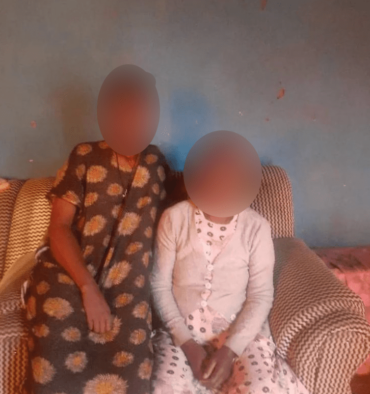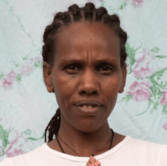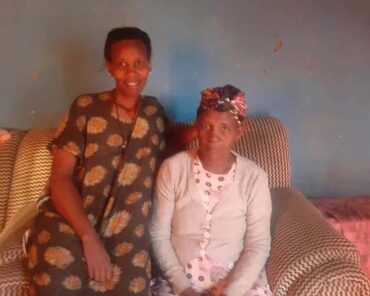Meseret Hailu’s 8 Years of Torture and Enslavement with Dr. May Saadeh
In March 2012, Meseret Hailu vanished working for Dr. May Saadeh. Her family did not hear from her until 7.5 years later. They feared she was dead.
Worker
Meseret Hailu
Employer
Dr. May Saadeh
THE STORY
Back in her country of birth, Ethiopia, Meseret Hailu continues her path to recovery, two years after returning from a hellish seven years in the Lebanese capital Beirut, in which she was enslaved in the home of a Lebanese family and cut off from the outside world.
“My madame didn’t allow me to even meet the neighbours, let alone have friends” Meseret Hailu told This Is Lebanon. “I was like an object, hidden away in a room and brought out just to clean.”
In Lebanon, the Kafala system often forces workers to suffer horrific abuses including forced labour and enslavement for years, or even decades, with no accountability or redress for their plight. Just a few weeks ago, This Is Lebanon fought for the freedom of Sajita Lama, a Nepali domestic worker, who spent nearly ten years working for the Khoury/Germanos family in Beirut without pay. It took this widespread public campaign for authorities to take action to rescue her from her abusers. There is no expectation of the employers suffering any consequences for this action.
However, Meseret Hailu’s story differs from most others, as it is the subject of a lawsuit, the first of its kind filed against her employer, Dr. May Saadeh, 49, divorced mother of three and a Lebanese dentist who lived in the city of Jounieh. Also included in the lawsuit, the local employment agency that contracted Meseret Hailu. On 19 October 2021, a court hearing was held for the country’s first ever case in which the accused face charges of slavery and slave trading. The accused failed to be present in court and the case has been postponed until February of next year.
But how did things get to this point? Meseret Hailu's story was featured in an Al Jazeera article which highlighted her plight and those of two other Ethiopian domestic workers who were enslaved by their employers in Lebanon. This Is Lebanon first came across her case in 2018, when she was still missing and feared dead by her family. This article documented how we came across her story and fought for her freedom.
Meseret Hailu Goes to Lebanon
Like most migrant domestic workers, Meseret Hailu sought to help her impoverished family. Her mother was against her traveling to the Middle East for work, but her mind was set, and she flew out of Ethiopia, landing in Beirut on February 8th 2011, aged 26.
She was immediately hired by Dr. May Saadeh, who lived in a high rise apartment, and settled into the home. Meseret Hailu describes the initial period as smooth, and so did her mother in conversation with Al Jazeera. The apartment is located on the fourth floor of a building in the Kfarhbab area. Dr. May Saadeh, is a card-carrying member of the Lebanese Orthodontic Society, with her full name, May Assaad Saadeh, phone number and email, still listed on the organization’s website. She is very well known and recognizable for her public support of her son, a singing sensation whose videos on YouTube have garnered millions of views. She has appeared on screens across the Middle East, on the likes of The Voice and MBC Kids.
During the first thirteen months in the job, Meseret Hailu was paid regularly and was able to make sporadic phone calls to her mother in Ethiopia. Then after that, she was suddenly cut off. At the time, Dr. May Saadeh was involved in bitter fighting with her ex-husband that caused her great strain and frustration, Meseret Hailu recalls. Unfortunately, Meseret Hailu became the target of her rage.
Back in Ethiopia, Meseret Hailu family had no idea why they suddenly could no longer reach her. Her mother, EA stated that she was given no warning and that she started to fear for her daughter’s well-being.
“I don’t know why she suddenly stopped calling,” EA told Al Jazeera. “She just vanished.”
This was in March 2012. EA wouldn’t hear from her daughter again for seven-and-a-half years.
Those anguish-filled years were years of uncertainty for both mother and daughter. As Meseret Hailu explains, Dr. Saadeh changed and gradually became “a monster” who treated her worse than an animal.
“I don’t know why she suddenly stopped calling,” EA said. “She just vanished.”
“Firstly, from that day on, my madame forbade me from growing my hair,” Meseret Hailu told This Is Lebanon. “I have no idea why she did this, but she cut my hair and I had it short for the next eight years.”
Meseret Hailu was no longer given monthly phone privileges or a salary. Raising questions about why she wasn’t being paid resulted in her being physically struck, insulted and threatened. Dr. Saadeh often resorted to using racial slurs targeting Meseret Hailu's skin colour and nationality, and she used degrading terms around her with regularity.
“She used to call me a black slave or sharmouta” she said, referring to the Arabic word for whore. “I don’t think I went a single day in that home without hearing those words. They used to hurt me a lot. But after a few years, I grew numb to hearing them.”
“I don’t think I went a single day in that home without hearing those words. They used to hurt me a lot. But after a few years, I grew numb to hearing them.”
Meseret Hailu would work from dawn until dusk with no days off. When the family went out, the door would be locked and Meseret Hailu would be confined to her bedroom. On bad days, Dr. Saadeh would hit or kick her. Meseret Hailu's breaks from work would be at night, when she’d cry herself to sleep and dream of being reunited with her family.
“Sometimes, she would threaten me with a knife,” Meseret Hailu told This Is Lebanon. “Or she would say that she would bring someone to kill me."
Due to Meseret Hailu's virtual imprisonment, she knew little of the neighbourhood and says she would have gotten lost if let out on her own. Still, this didn’t prevent her from contemplating escape.
“I was living the worst kind of hell in that home. I wished I had never left Ethiopia,” Meseret Hailu says. “Of course I thought about escaping all the time. But the only way would be to jump out of the fourth-floor window. I didn’t want to die or break my legs trying to escape.”
“I was living the worst kind of hell in that home. I wished I had never left Ethiopia”
And so Meseret Hailu endured years of this misery. Back in Ethiopia, her parents made repeated trips to the Ethiopian Foreign Ministry, begging for assistance in locating their daughter. Elsewhere in Beirut, several friends and a cousin of hers, all of whom were working as domestic workers in the country, visited Ethiopia’s consulate in Beirut and asked Ethiopian diplomats to intervene on her behalf.
A Trip to the Consulate
In November 2014, almost three years into her captivity, Meseret Hailu thought she had the perfect opportunity to escape. Dr. Saadeh had done everything to maintain her public reputation as a dental professional and an honored member of society. Keeping an Ethiopian woman in her home against her will would be bad for her profile. As such, Dr. Saadeh was eager to renew Meseret Hailu's residency papers, fearing that if they expired, it might lead to authorities investigating and possibly revealing her secret to lurking neighbours.
To renew residency papers, an Ethiopian domestic worker’s passport must also be renewed, a process that requires her to go in person to the Ethiopian consulate and have her sign documents in addition to having her picture taken. Meseret Hailu knew this meant that she’d be allowed to leave the confines of the Saadeh residence and be allowed into the Ethiopian consulate, an environment where the working language wasn’t Arabic, but her native Amharic, a language Dr. Saadeh doesn’t speak.
Meseret Hailu's friends had notified the consulate on multiple occasions that she had gone missing. In Ethiopia, her parents had opened a file with the Foreign Ministry and were told that the institution would do everything possible to relocate her.
Over the years, This Is Lebanon has documented many occurrences where the Ethiopian consulate has failed to provide necessary protection to its citizens facing abuse at the hand of their employers. Many have reported that Ethiopian diplomats have sent victims back to the homes where they’ve endured torture and have covered up multiple deaths of Ethiopian domestic workers.
Dr. Saadeh brought Meseret Hailu to the consulate to sign a few documents and have her passport picture taken. Once there however, Meseret Hailu started speaking in Amharic to the Ethiopian staff present, pleading with them to rescue her from the horrors she was living.
“I told them, I want to return home. I don’t want to go back with her,” Meseret Hailu remembers. “I asked them to save me.”
Meseret Hailu's emotions spoke loudly, and Dr. Saadeh, despite being unable to understand Amharic, soon realized the nature of her communications and grew furious.
Meseret Hailu says that Ethiopian diplomats let her down. One grew angry with her and yelled at her saying, according to Meseret Hailu, “You came here to work, you can’t just ask to go home.”
Another diplomat conversed with Dr. Saadeh in English, which Meseret Hailu couldn’t understand. That diplomat then turned to Meseret Hailu. “We can’t help you. You have a contract. You need to return with her now.”
Meseret Hailu begged for them not to let her take her, in vain. “Don’t worry,” the diplomat said. “She said you’ll be allowed to go next month. Go with her, you’ll be fine.”
“We can’t help you. You have a contract. You need to return with her now.”
And with that, the window of opportunity to escape was shut firmly. Meseret Hailu was taken back home. Dr. Saadeh, furious, told her that day that if anyone were to learn of her plight, she would kill her.
This Is Lebanon has since learned the identity of one of the diplomats, the one who spoke in English with Dr. Saadeh and later told Meseret Hailu he couldn’t help her. The diplomat, Getachew Mekebo Wajebo, worked in the Beirut consulate in 2014 and has since risen through the ranks to become the Foreign Ministry’s Director for China Affairs.
Mr. Wajebo failed to protect a fellow citizen, sending her back to rot in an abusive home for many more years. Meseret Hailu described crying with hopelessness at night for weeks after diplomats abandoned her to her fate.
Meseret Hailu continued to suffer, while Dr. Saadeh’s cruelty never waned. Meseret Hailu told This Is Lebanon, that even Dr. Saadeh’s children pitied Meseret Hailu, describing an incident in which the eldest daughter revolted against her mother, demanding she allow Meseret Hailu to return to her family.
“She felt as though she owned me, like I was property or a pet"
But the dentist wouldn’t give in. “She felt as though she owned me, like I was property or a pet,” Meseret Hailu said, citing years of dehumanizing language and physical violence as evidence of this.
Meseret Hailu's Mother Contacts This Is Lebanon
This Is Lebanon was first made aware of the case in November 2018, after Meseret Hailu's mother and friends of hers in Ethiopia sent a message on our official Facebook page.
By this time, Meseret Hailu had been working in the Saadeh home for almost eight years, and without wages for seven of those years. This Is Lebanon case workers mobilized firstly to locate Meseret Hailu and her employer.
Meseret Hailu's family no longer had valid contact information for Dr. Saadeh. After much effort, we managed to obtain the dentist’s phone number. Over the course of months, we started negotiations with Dr. Saadeh, who after initially denying that she even had a domestic worker, later stated that her worker had run away and was no longer in her home. Because of her lack of cooperation, This Is Lebanon looked at a variety of different options.
We hired a lawyer in Ethiopia to gather the necessary documents from her family to begin the legal process. However, the Lebanese legal system has an extremely poor track record in safeguarding the rights of domestic workers. We referred the case to a legal agency, but we simultaneously continued our work and approach. Unfortunately, the legal system was unable to provide assistance in getting her released from her employers in Lebanon or help recover her salary.
Eventually, our team managed to obtain the Saadeh address and confirm that Meseret Hailu was still alive and in the home.
In July of 2019, This Is Lebanon handed files to an Ethiopian journalist, known for investigating cases of missing and murdered Ethiopian domestic workers in Lebanon. In September, he visited the home of Meseret Hailu's mother, EA.
Meseret Hailu's heartbroken mother explained in her interview, that her husband had left her, and that without her daughter, she had no reason to remain on this earth.
Shortly after the interview, a This Is Lebanon caseworker contacted Dr. Saadeh, and explained that a journalist had visited the mother of Meseret Hailu and that a story was likely to be published on her plight soon. Our negotiator also added that we had compiled a dossier on her, and that if she wouldn’t release Meseret Hailu,, we would publish her details on our Facebook page, which at the time had 60,000 followers, all of whom tuned in to see which abuser would be shamed. Dr. Saadeh might have noticed a similar case in which public pressure eventually forced the release of a young Ethiopian woman, Lensa, held in captivity by the family behind the Eleanore Couture fashion brand.
Something about what Dr. Saadeh saw changed things. Meseret Hailu describes being told out of the blue to make a phone call to her mother. Surprised, she made her first phone call to Ethiopia in seven years, where her elated mother could barely contain herself. Then she was told that she would be leaving for Ethiopia. A few days later, still stunned, she was on a flight back to Addis Ababa.
Meseret Hailu had worked every day for nearly nine years and endured a litany of abuses while working for Dr. Saadeh. On the day she left, she was given $50 and nothing else. Meseret Hailu landed on Ethiopian soil in September 2019, with nothing but the clothes on her back and still clutching the cash she was handed.
Meseret Hailu, her mother and extended family finally had their tearful reunion after eight and a half years. But returning empty-handed was psychologically crushing for her. Despite being happy to be home, the words of neighbours and some less than sympathetic relatives hurt her a lot. Many, with no understanding of what she had lived through, asked her why she stayed in the home for so long if she wasn’t being paid. The voices were many and were frequent, so she left town for a few months, living with friends while she recollected herself and readjusted to life in Ethiopia.
Shortly after her arrival, she contacted This Is Lebanon and sent us a video filmed in selfie mode, in which she is seen speaking in both Arabic, which she had grown fluent in, and Amharic, about the circumstances of her departure, and the fact that her former employer owed her years of salary. In the video, in which Meseret Hailu is still seen with the short hair she was forced to keep in that home, she identifies her former employer by name. She claims to have been forced to sign a document without any knowledge of what was written in it.
Meseret Hailu has since had a few therapy sessions, but continues to have nightmares and struggles to sleep. Coping is a tough process, but she’s coming along well. One way of healing has been allowing her hair to grow and braiding it in different styles, something she wasn’t able to do for so long.
Prior to Lebanon’s economic crash, Ethiopian domestic workers were paid a meager 150 USD monthly. At this rate, Dr. May Saadeh would owe Meseret Hailu at the very least, 12,000 USD and this doesn’t include damages for the years of torture and abuse. We have very little hope that the Lebanese judicial system, which has failed migrant domestic workers time and time again, will deliver the justice needed in this case. Nevertheless, we are glad that the case appears to be highlighting the suffering migrant domestic workers in Lebanon experience. Justice is a long journey with one step at a time. We hope the courts move this a step forward.
TAKE ACTION
We can't do this alone. We need your help! Join us in this fight.
Contact the Sponsors
Talk to Dr May Saadeh and ask her to pay Meseret Hailu her rightfully owed salary.
Share the Story
Tell others about this. Join us in the fight to ensure that Dr May Saadeh is brought to justice.
Join Our Work
We need your help to continue our efforts in fighting for Meseret Hailu and others like her.
Get the Updates
Get the updates straight into your inbox so you don't miss any part of the story.
COMMENTS
القصة
بعد أن عادت إلى موطنها إثيوبيا منذ سنتين، تواصل ميسيريت هايلو مسيرتها في التعافي، بعد سبع سنوات من الجحيم في العاصمة اللبنانية بيروت، حيث تم استعبادها في منزل عائلة لبنانية وإقصاؤها عن العالم الخارجي.
قالت ميسيريت هايلو لجمعية "هذا لبنان": "لم تكن سيدتي تسمح لي حتى بمقابلة الجيران، ناهيك عن أن يكون لدي أصدقاء. لقد كنت كأحد الأشياء المخبأة في غرفة ولا يتم إخراجها إلا للتنظيف فقط."
في لبنان، غالباً ما يجبِر نظام "كفالة" العاملات على معاناة انتهاكات مروعة، بما في ذلك العمل القسري والاستعباد لسنوات، أو حتى عقود، دون مساءلة أو تعويض عن محنتهنّ. قبل أسابيع قليلة فقط، ناضلت جمعية "هذا لبنان" من أجل إطلاق سراح ساجيتا لاما، عاملة منزل من نيبال، كانت قد أمضت ما يقارب العشر سنوات تعمل لدى عائلة خوري / جرمانوس في بيروت بدون أجر. وقد تطلب الأمر تلك الحملة الشعبية الواسعة النطاق كي تتحرك السلطات لإنقاذها من المستغلين لها. وليس متوقعاً أن يتحمل أصحاب العمل أية عواقب لفعلهم هذا.
إلا أن قصة ميسيريت هايلو لا تشبه غيرها الكثير من القصص، فهي موضوع دعوى قضائية، الأولى من نوعها مرفوعة ضد صاحبة العمل الدكتورة مي سعادة، 49 عاماً، مطلقة وأم لثلاثة أطفال وطبيبة أسنان لبنانية تعيش في مدينة جونيه. وقد شملت الدعوى أيضاً وكالة التوظيف المحلية التي تعاقدت مع ميسيريت هايلو في 19 تشرين الأول 2021، انعقدت جلسة استماع لأول قضية في البلاد يواجه فيها المدّعى عليهم اتهامات بالاستعباد وتجارة الرقيق. لم يحضر المتّهمون إلى المحكمة وتم تأجيل القضية حتى شباط من العام المقبل.
لكن كيف وصلت الأمور إلى هذه المرحلة؟ لقد ظهرت قصة ميسيريت هايلو في مقال على موقع الجزيرة سلطت الضوء على محنتها بالإضافة إلى معاناة عاملتي منزل إثيوبيتين أخريين تم استعبادهما من قبل أصحاب العمل في لبنان. سمعت جمعية "هذا لبنان" بقضيتها لأول مرة عام 2018، حين كانت لا تزال مفقودة و خشيت عائلتها أن تكون قد ماتت. في هذه المقالة، نوثّق كيف سمعنا بقصتها وناضلنا من أجل تحريرها.
ذهاب ميسيريت هايلو إلى لبنان
مثل حال معظم عاملات المنازل الوافدات، سعت ميسيريت هايلو إلى مساعدة أسرتها الفقيرة. كانت والدتها تعارض سفرها إلى الشرق الأوسط من أجل العمل، لكنها عقدت عزمها، فطارت من إثيوبيا، وحطت في بيروت في 8 شباط 2011، وهي تبلغ من العمر 26 عاماً.
تم توظيفها على الفور من قبل الدكتورة مي سعادة، التي كانت تعيش في شقة عالية، واستقرت في المنزل. تصف ميسيريت هايلو الفترة الأولى بأنها ميَسَّرة، وأكدت ذلك والدتها في محادثة مع قناة الجزيرة. تقع الشقة في الطابق الرابع من مبنى في منطقة كفرحباب. تحمل مي سعادة بطاقة عضوية في جمعية تقويم الأسنان اللبنانية، ولا يزال اسمها الكامل، مي أسعد سعادة، مسجلاً على موقع الجمعية مع رقم هاتفها وبريدها الإلكتروني. إنها مشهورة ومعروفة بدعمها العلني لابنها، وهو نجم غنائي حازت مقاطع الفيديو الخاصة به على ملايين المشاهدات على يوتيوب. وقد ظهرت على الشاشات في جميع أنحاء الشرق الأوسط، مثل The Voice و MBC Kids.
خلال الأشهر الثلاثة عشر الأولى في المنزل، كانت ميسيريت هايلو تتقاضى رواتبها بانتظام وقد أجرت مكالمات هاتفية متفرقة مع والدتها في إثيوبيا. وفجأة بعد ذلك، تم عزلها. في ذلك الحين، كانت الدكتورة مي سعادة متورطة في عراك مرير مع زوجها السابق تسبب لها في إجهاد وإحباط كبيرين، كما تتذكر ميسيريت هايلو لسوء الحظ، أصبحت م.ه هدفاً لغيظها.
في إثيوبيا لم يكن لدى عائلةميسيريت هايلو أية فكرة عن سبب عدم تمكنهم فجأة من الإتصال بها. صرّحت والدتها، إ.أ بأنها لم تتلقَّ أي تحذير عن ذلك فبدأت تخشى على سلامة ابنتها.
قالت إ.أ للجزيرة: "لقد اختفت هكذا بكل بساطة".
كان هذا في آذار 2012. لم تسمع إميبت عن ابنتها مجدداً مدة سبع سنوات ونصف.
كانت تلك السنوات المليئة بالكرب والأسى دهراً من عدم اليقين لكلٍّ من الأم وابنتها. كما كما توضح ميسيريت هايلو، فقد تغيرت الدكتورة سعادة وتحولت تدريجياً إلى "وحش" يعاملها معاملة أسوأ من الحيوان.
قالت إ.أ: "لا أعلم لماذا توقفت فجأة عن الاتصال بنا، لقد اختفت هكذا بكل بساطة".
قالت ميسيريت هايلو لجمعية "هذا لبنان :" "أولاً، منذ ذلك اليوم وصاعداً، منعتني سيدتي من إطالة شعري، وليس لدي أدنى فكرة عن سبب قيامها بذلك، لكنها قصّت شعري وبقي قصيراً على مدار السنوات الثماني التالية."
لم تعد تُمنح ميسيريت هايلو راتباً أو امتياز التكلم بالهاتف شهرياً. أدى التساؤل عن سبب عدم قبضها لراتبها إلى تعرضها للضرب الجسدي والإهانة والتهديد. وغالباً ما لجأت الدكتورة سعادة إلى استخدام الإهانات العرقية التي تستهدف لون بشرة ميسيريت هايلو وجنسيتها، واستخدمت مصطلحات مهينة باستمرار.
قالت: "كانت تناديني بالعبدة السوداء أو الشرموطة"، في إشارة إلى الكلمة العربية التي تعني عاهرة. "لا أعتقد أنه مرّ يوم واحد في ذلك المنزل دون سماع هذه الكلمات التي كانت تجرحني كثيراً. ولكن بعد بضع سنوات، تخدّر إحساسي لسماعهم."
"لا أعتقد أنه مرّ يوم واحد في ذلك المنزل دون سماع هذه الكلمات التي كانت تجرحني كثيراً. ولكن بعد بضع سنوات، تخدّر إحساسي لسماعهم."
كانت ميسيريت هايلو تعمل من الفجر حتى الغسق وبدون أيام عطلة. عند خروج الأسرة من المنزل، كان الباب يُقفَل وتبقى ميسيريت هايلو في غرفة نومها. في الأيام العصيبة كانت الدكتورة سعادة تضربها أو تركلها. كانت ميسيريت هايلو تستريح من العمل في الليل، حين تبكي حتى تغفو وتحلم بجمع شملها مع عائلتها.
قالت ميسيريت هايلو لجمعية "هذا لبنان": "في بعض الأحيان، كانت تهدّدني بسكين، أو كانت تقول إنها ستأتي بأحدهم لقتلي."
بسبب سجن ميسيريت هايلو الافتراضي، لم تكن تعرف سوى القليل عن الحي وتقول أنها كانت ستضيع لو تُركت بمفردها في الخارج. لكن هذا لم يمنعها من التفكير في الهروب.
تقول ميسيريت هايلو: "كنت أعيش أسوأ أنواع الجحيم في ذلك المنزل، وتمنيت لو لم أغادر إثيوبيا أبداً". "بالطبع كنت أفكر في الهروب طوال الوقت. لكن الطريقة الوحيدة هي القفز من نافذة الطابق الرابع. لم أكن أريد أن أموت أو أكسر ساقي بينما أحاول الهرب."
"كنت أعيش أسوأ أنواع الجحيم في ذلك المنزل، وتمنيت لو لم أغادر إثيوبيا أبداً".
وهكذا عانت ميسيريت هايلو سنوات من هذا الشقاء. أما في إثيوبيا، فقد ذهب والداها مراراً إلى وزارة الخارجية الإثيوبية، متوسلين المساعدة في تحديد مكان ابنتهما. وفي مكان آخر في بيروت، قامت نسيبتها مع العديد من الصديقات، وجميعهن يعملن في الخدمة المنزلية في البلاد، بمراجعة قنصلية إثيوبيا في بيروت وطلبن نيابة عنها من دبلوماسيين إثيوبيين أن يتدخلوا.
زيارة إلى القنصلية
في تشرين الثاني 2014، وبعد مرور ما يقارب الثلاث سنوات على أسرها، فكرت م.ه أن لديها فرصة مثالية للهروب. لقد بذلت الدكتورة سعادة كل ما في وسعها للحفاظ على سمعتها بين الناس كطبيبة أسنان محترفة وعضوة محترمة في المجتمع. فإن إبقاء امرأة إثيوبية في منزلها ضد إرادتها سيكون معيباً لمكانتها. وعلى هذا النحو، كانت الدكتورة سعادة حريصة على تجديد أوراق إقامة م.ه، خوفاً من أنه إذا انتهت صلاحيتها، فقد يؤدي ذلك إلى قيام السلطات بالتحقيق وربما الكشف عن سرها لجيرانها المتربصين بها.
لتجديد أوراق الإقامة، يجب أيضاً تجديد جواز سفر عاملة المنزل الإثيوبية. وهي عملية تتطلب منها الحضور شخصياً إلى القنصلية الإثيوبية وتوقيعها على مستندات بالإضافة إلى التقاط صورتها. عرفت م.ه أن هذا يعني السماح لها بمغادرة السجن حيث تقيم عائلة سعادة و الدخول إلى القنصلية الإثيوبية، وهو وسط لم تكن لغة العمل فيه اللغة العربية، بل لغتها الأم الأمهرية، وهي لغة لا تعرفها الدكتورة سعادة.
أبلغت صديقات م.ه القنصلية بأنها مفقودة عدة مرات. وفي إثيوبيا، فتح والداها ملفاً لدى وزارة الخارجية حيث قيل لهما إن الوزارة ستبذل قصارى جهدها لإيجاد مكانها وإحضارها.
على مر السنين، قامت جمعية "هذا لبنان" بتوثيق العديد من الحوادث التي فشلت فيها القنصلية الإثيوبية بتقديم الحماية اللازمة لمواطناتها اللواتي يواجهن الانتهاكات على أيدي أصحاب العمل. وأفاد الكثيرون أن الدبلوماسيين الإثيوبيين أعادوا الضحايا إلى المنازل التي تعرضوا فيها للتعذيب وتستّروا على عدة حالات وفاة عاملات منازل إثيوبيات.
أحضرت الدكتورة سعادة م.ه إلى القنصلية لتوقيع بعض الوثائق وتصوير جواز سفرها. وبمجرد وصولها إلى هناك، بدأت م.ه تتحدث باللغة الأمهرية إلى الموظفين الإثيوبيين الذين كانوا هناك، متوسلة إياهم لإنقاذها من الويلات التي كانت تعيشها.
تتذكر م.ه: "قلت لهم، أريد العودة إلى بلدي. لا أريد أن أعود معها. وطلبت منهم أن ينقذوني."
أظهرت م.ه أقصى ما لديها من مشاعر، وسرعان ما أدركت الدكتورة سعادة طبيعة تواصلها معهم، على الرغم من عدم قدرتها على فهم اللغة الأمهرية، فثار غضبها.
تقول ميسيريت هايلوأن الدبلوماسيين الإثيوبيين خذلوها. فقد غضب أحدهم منها وصرخ في وجهها قائلاً، حسب قول م.ه: "لقد أتيتِ إلى هنا للعمل، فلا يمكنك طلب العودة إلى الوطن هكذا ببساطة."
ودبلوماسي آخر تحدث مع د. سعادة باللغة الإنجليزية، التي لم تستطع ميسيريت هايلو فهمها. ثم التفت ذلك الدبلوماسي إلى م.ه وقال: "لا يمكننا مساعدتك. لديك عقد. عليك العودة معها الآن."
توسلت م.ه لهم ألا يسمحوا لها بأن تأخذها، لكن عبثاً. أجابها الدبلوماسي: "اطمئني. فقد قالت أنه سيُسمح لك بالمغادرة الشهر المقبل. اذهبي معها، ستكونين بخير."
"لا يمكننا مساعدتك. أنت مرتبطة بعقد. عليك العودة معها الآن."
وبهذا، أُغلِقت بإحكام نافذة فرصة الهروب. وأعيدت ميسيريت هايلو إلى المنزل. قالت لها الدكتورة سعادة في ذلك اليوم بغضب، أنه إذا علم أحدهم بمعاناتها، فسوف تقتلها.
منذ ذلك الحين، علمت جمعية "هذا لبنان" هوية أحد الدبلوماسيين، وهو الذي تحدث بالإنجليزية مع د. سعادة وأخبر ميسيريت هايلو لاحقاً أنه لا يمكنه مساعدتها. لقد عمل الدبلوماسي غيتاتشو ميكيبو واجيبو في قنصلية بيروت عام 2014، و منذئذ ارتقى في الرّتب ليصبح مدير وزارة الخارجية لشؤون الصين.
فشل السيد واجيبو بحماية إحدى مواطنات بلده، وأعادها لتتعفن في منزل استغلالي لسنوات عديدة أخرى. وصفت ميسيريت هايلو البكاء يائسة في الليل لأسابيع بعد أن تخلى الدبلوماسيون عنها وتركوها لمصيرها.
استمرت معاناة ميسيريت هايلو، في حين أن قسوة الدكتورة سعادة لم تتراجع أبداً. وقالت ميسيريت هايلو لجمعية "هذا لبنان" إنه حتى أولاد الدكتورة سعادة أشفقوا عليها، واصفة حادثة ثارت فيها الابنة الكبرى على والدتها، وطالبتها بالسماح ل م.ه بالعودة إلى عائلتها.
لكن طبيبة الأسنان لم ترضخ. قالت ميسيريت هايلو "كانت تشعر كما لو أنها تمتلكني، وكأنني أحد مقتنياتها أو حيوان أليف." مستشهدة بسنوات من اللغة الوحشية والعنف الجسدي كدليل على ذلك.
"كانت تشعر كما لو أنها تملكني، وكأنني أحد مقتنياتها أو حيوان أليف."
"اتصال والدة ميسيريت هايلو بجمعية "هذا لبنان
تم إبلاغ "هذا لبنان" بالقضية لأول مرة في تشرين الثاني 2018، بعد أن أرسلت والدة ميسيريت هايلو وصديقاتها في إثيوبيا رسالة على صفحتنا الرسمية على فيسبوك.
وإلى ذلك الحين، كانت ميسيريت هايلو تعمل في منزل سعادة قرابة ثماني سنوات، ستة منها بدون أجر. تحرك العاملون في "هذا لبنان" أولاً لتحديد مكان ميسيريت هايلو وصاحبة العمل.
لم يعد لدى عائلة ميسيريت هايلو أرقام هاتف صحيحة للدكتورة سعادة. وبعد مجهود كبير، تمكنّا من الحصول على رقم هاتف طبيبة الأسنان. وعلى مدى أشهر بدأنا مفاوضات مع د. سعادة، التي بعد أن أنكرت في البداية وجود عاملة منزل لديها، ذكرت لاحقاً أن عاملتها هربت ولم تعد لديها في المنزل. ونظراً لافتقارها إلى التعاون، درست جمعية "هذا لبنان" خيارات متعددة.
وظّفنا محامٍ في إثيوبيا ليجمع المستندات اللازمة من عائلتها لبدء الإجراءات القانونية. ومع ذلك، فإن النظام القانوني اللبناني له سجل سيئ للغاية في حماية حقوق عاملات المنازل. قمنا بإحالة القضية إلى هيئة قانونية، لكننا واصلنا في الوقت نفسه عملنا وتقدّمَنا. لسوء الحظ، لم يتمكن النظام القانوني من تقديم المساعدة في إطلاق سراحها من أصحاب العمل في لبنان أو المساعدة في الحصول على راتبها.
في النهاية، تمكن فريقنا من الحصول على عنوان سعادة والتأكيد بأن م.ه ما زالت على قيد الحياة وفي المنزل.
في تموز 2019، سلّم "هذا لبنان" الملفات إلى صحفي إثيوبي معروف بالتحقيق في قضايا عاملات منازل إثيوبيات مفقودات ومقتولات في لبنان. في أيلول، زار منزل والدة ميسيريت هايلو، إ.أ.
أوضحت والدة ميسيريت هايلو الحزينة في مقابلتها، أن زوجها تركها، وأنه ليس لديها سبب للبقاء على هذه الأرض بدون ابنتها.
بعد فترة وجيزة من المقابلة، اتصلت ناشطة في "هذا لبنان" بالدكتورة سعادة، وأوضحت أن صحفياً قد زار والدةميسيريت هايلو وأنه من المرجح أن تُنشَر قصة عن معاناتها قريباً. أضافت المفاوضة لدينا أيضاً أننا قمنا بتجميع إضبارة عنها، وأنه إذا لم تفرج عن ميسيريت هايلو ، فسننشر تفاصيلها في صفحتنا على فيسبوك، والتي كان لديها في ذلك الوقت 60000 متابع، وجميعهم يتابعون لمعرفة أي من المستغلين سيتم فضحه. قد تكون الدكتورة سعادة قد انتبهت إلى حالة مماثلة أجبر فيها الضغط الجماهيري في النهاية على إطلاق سراح الشابة الإثيوبية، لينسا، والتي كانت محتجزة كأسيرة من قبل العائلة المالكة لماركة أزياء إليانور كوتور.
هناك شيء ما شاهدته د. سعادة غيّر الأمور. تصف م.ه أنه طُلب منها فجأة الإتصال بوالدتها. وهي مندهشة، أجرت أول مكالمة هاتفية لها مع إثيوبيا منذ سبع سنوات، حيث بالكاد تمكنت والدتها المبتهجة من أن تتمالك نفسها. ثم قيل لها أنها ستغادر إلى إثيوبيا. بعد بضعة أيام، وهي لا تزال في حالة ذهول، كانت على متن رحلة عائدة إلى أديس أبابا.
عملت ميسيريت هايلو يومياً طوال مدة تسع سنوات تقريباً وتحملت سلسلة من الانتهاكات أثناء عملها لدى الدكتور سعادة. وفي اليوم الذي غادرت فيه، أعطتها خمسين دولار فقط لا غير. هبطت ميسيريت هايلو على الأراضي الإثيوبية في أيلول 2019، وهي لا تحمل شيئاً سوى الملابس التي كانت تلبسها ولا تزال ممسكة بالنقود التي استلمتها.
أخيراً اجتمع شمل م.ه مع والدتها وعائلتها الكبيرة بالدموع بعد ثماني سنوات ونصف. لكن عودتها خاوية الوفاض كان أمراً محطماً لها نفسياً. وعلى الرغم من سعادتها بالعودة إلى أهلها، إلا أن كلام الجيران وبعض الأقارب الأقل تعاطفاً معها كان يجرحها كثيراً. سألها الكثيرون عن سبب بقائها في ذلك المنزل لفترة طويلة كهذه إن لم تكن تتقاضى أجراً، بدون أن يفهموا ما الذي عانت منه. كانت الآراء كثيرة ومتواترة، لذلك غادرت المدينة لبضعة أشهر، وعاشت مع صديقات لها بينما تستجمع قواها وتتكيف مع الحياة في إثيوبيا.
بعد وصولها بفترة وجيزة، اتصلت بجمعية "هذا لبنان" وأرسلت إلينا مقطع فيديو تم تصويره في وضعية selfie، حيث يمكن مشاهدتها تتحدث باللغتين العربية التي كانت قد أتقنتها، واللغة الأمهرية، عن ظروف رحيلها، وحقيقة أن صاحبة العمل السابقة تدين لها بسنوات من دون أجر. وفي الفيديو، الذي لا تزال فيه ميسيريت هايلو تظهر بالشعر القصير الذي كانت مُجبرة عليه في ذلك المنزل، تحدد صاحبة العمل السابقة بالاسم. وتقول بأنه تم إجبارها على التوقيع على مستند دون معرفة ما الذي مكتوب فيه.
خضعت ميسيريت هايلو لبضع جلسات علاجية منذ ذلك الحين، إلا أنها ما زالت تعاني من الكوابيس والأرق. إن التأقلم عملية صعبة، لكنها تتعافى جيداً. إحدى طرق العلاج كانت السماح لشعرها بالنمو وتجديله بأساليب مختلفة، الأمر الذي لم تكن قادرة على القيام به لفترة طويلة.
قبل الانهيار الاقتصادي في لبنان، كانت عاملة المنزل الإثيوبية تتقاضى مبلغاً ضئيلاً 150 دولار في الشهر. وبهذا المعدل، فإن الدكتورة مي سعادة تدين م.ه على الأقل بمبلغ قدره 12000 دولار، وهذا لا يشمل الأضرار خلال سنوات من التعنيف والتعذيب. لدينا بصيص أمل ضئيل في أن النظام القضائي اللبناني، الذي خذل عاملات المنازل الوافدات مراراً وتكراراً، سيحقق العدالة المطلوبة في هذه القضية. ومع ذلك، يسعدنا أن القضية تسلط الضوء على معاناة عاملات المنازل الوافدات في لبنان. العدالة مسيرة طويلة خطوة فخطوة. نأمل أن تحرك المحاكم هذه خطوة إلى الأمام.













